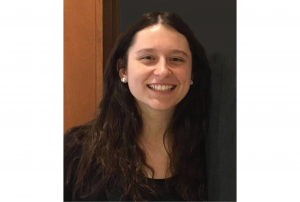Coffee machines with a hot cocoa option, decorative Edison bulbs, open floor plan – when I showed up to my first day of work three years ago, I thought JHTV was nothing short of an intern paradise. I was right, of course – but I didn’t even know the half of it yet.
 My days usually started with the aforementioned coffee (leveled up into a mocha after mixing with the hot cocoa), often enjoyed with some baked good that someone in the office brought from home to share. Energized, I’d dive into the day’s tasks. I interned in the intellectual property team, so a lot of my job was preparing patent applications for litigation. I’d read through invention disclosures submitted by powerhouses of the Hopkins community – anything from better orthopedic braces to molecular tracking techniques to pharmaceuticals – and collect background information about the technology or potential application that the legal teams might need to evaluate the its novelty. The work would be (pleasantly) interrupted throughout the day: my supervisor checking in to see if I needed any more support, lunch-and-learns with alum about things like careers in biotechnology, snack breaks with friends from my intern cohort. Wrapping up the day, I’d scribble down some notes about where I left off on a sticky note hanging from my desktop, maybe grab another coffee for the road, and walk down the cubicle-free office hall to a chorus of friendly goodbyes.
My days usually started with the aforementioned coffee (leveled up into a mocha after mixing with the hot cocoa), often enjoyed with some baked good that someone in the office brought from home to share. Energized, I’d dive into the day’s tasks. I interned in the intellectual property team, so a lot of my job was preparing patent applications for litigation. I’d read through invention disclosures submitted by powerhouses of the Hopkins community – anything from better orthopedic braces to molecular tracking techniques to pharmaceuticals – and collect background information about the technology or potential application that the legal teams might need to evaluate the its novelty. The work would be (pleasantly) interrupted throughout the day: my supervisor checking in to see if I needed any more support, lunch-and-learns with alum about things like careers in biotechnology, snack breaks with friends from my intern cohort. Wrapping up the day, I’d scribble down some notes about where I left off on a sticky note hanging from my desktop, maybe grab another coffee for the road, and walk down the cubicle-free office hall to a chorus of friendly goodbyes.
I applied to JHTV because I knew I wanted to work toward improving society, especially in healthcare, but I wasn’t sure if medicine or academia were really for me. As a biomedical engineering major, I had technical training in medical device design and in wet-lab research, and I wondered how I could best use these skills.
JHTV gave me my answer – the Commercialization Academy taught me not only how crucial translation is to the creation of an impactful technology, but also what goes into it.
Although my time at JHTV has now come to an end, the experience is far from over. Working at a technology transfer firm in the heart of a community so dedicated to biomedical innovation has exposed me to the limitless potential of academic discovery, taught me how to make it accessible, and equipped me to continue to do so. As I move forward to work as an engineer in a medical device company, I know that my passion for clinical translation is largely due to JHTV’s commitment to its mission and the incredible support network that it gave me.